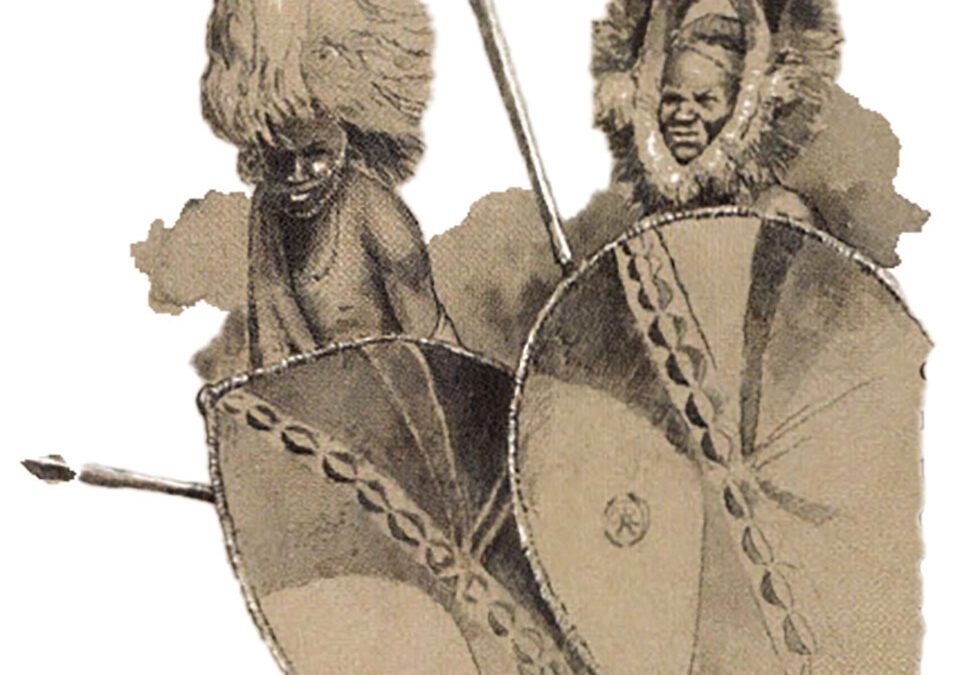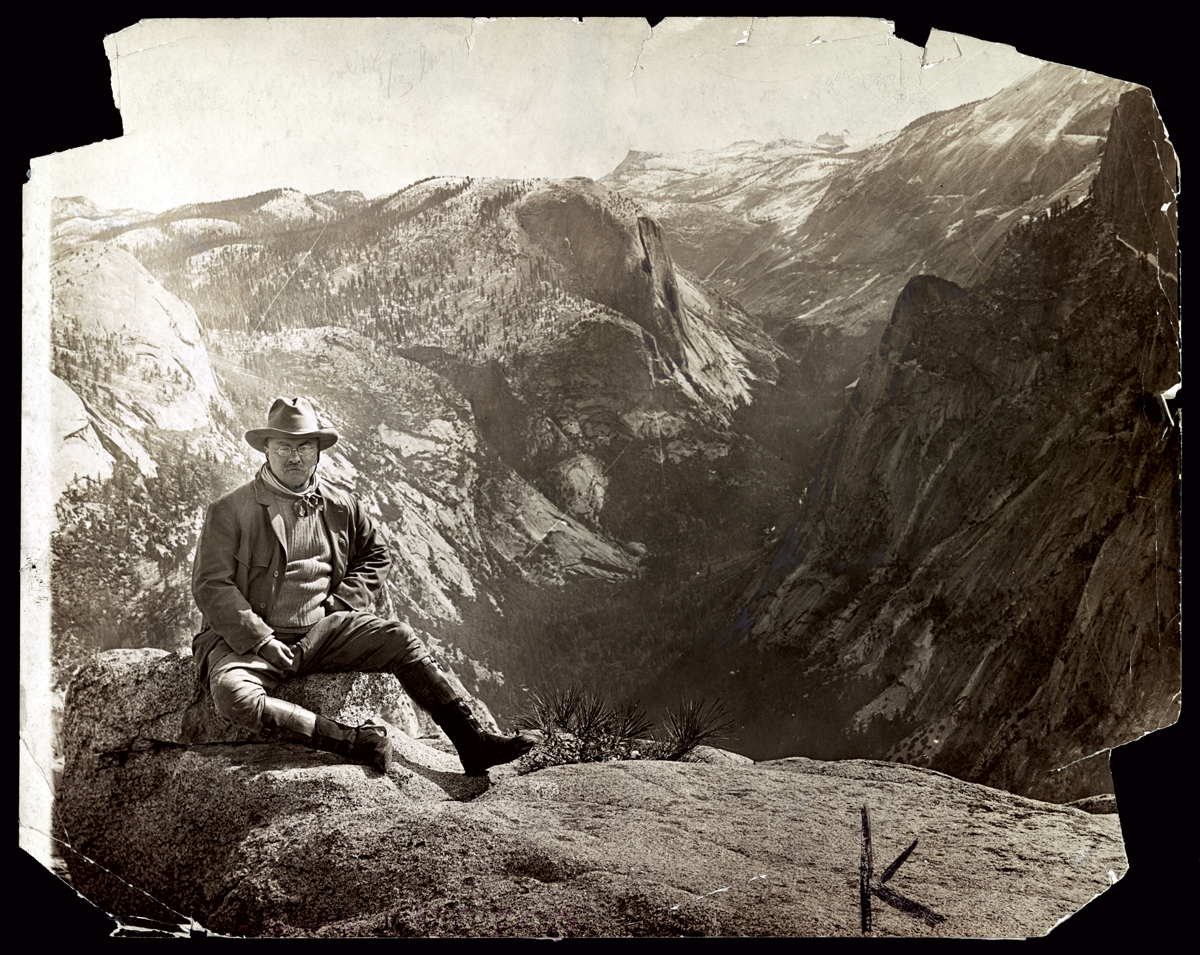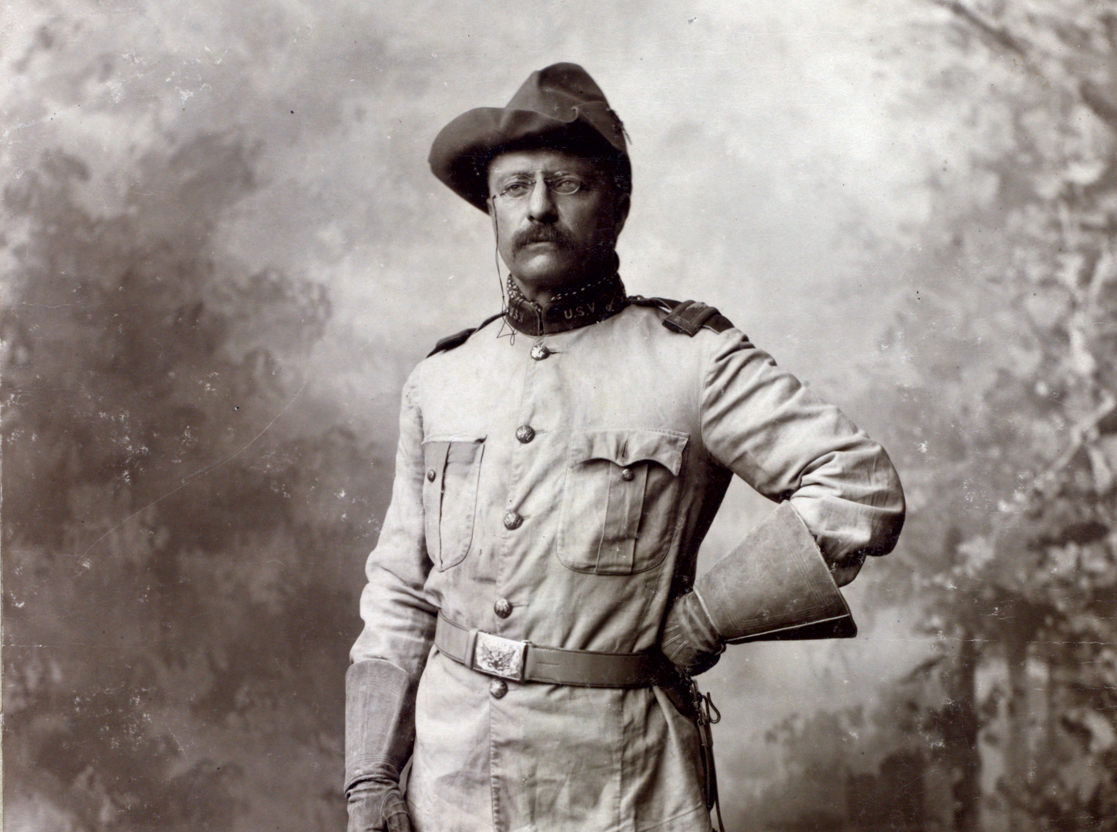At last the tense ring was complete, and the spearmen rose and closed in.
The next day, we moved camp to the edge of a swamp about five miles from the river. Near the tents was one of the trees which, not knowing its real name, we called “sausage-tree”; the seeds or fruits are encased in a kind of hard gourd, the size of a giant sausage, which swings loosely at the end of a long tendril. The swamp was half or three-quarters of a mile across, with one or two ponds in the middle, from which we shot ducks. Francolins — delicious eating, as the ducks were also — uttered their grating calls nearby; while oribi and hartebeest were usually to be seen from the tents. The hartebeest, by the way, in its three forms, is much the commonest game animal of East Africa.
A few miles beyond this swamp we suddenly came on a small herd of elephants in the open. There were eight cows and two calves, and they were moving slowly, feeding on the thorny tops of the scattered mimosas, and of other bushes which were thornless. The eyesight of elephants is very bad; I doubt whether they see more than a rather near-sigh ted man; and we walked up to within 70 yards of these, slight though the cover was, so that Kermit could try to photograph them. We did not need to kill another cow for the National Museum, and so after we had looked at the huge, interesting creatures as long as we wished, we croaked and whistled, and they moved off with leisurely indifference. There is always a fascination about watching elephants; they are such giants, they are so intelligent — much more so than any other game, except perhaps the lion ,whose intelligence has a very sinister bent — and they look so odd with their great ears flapping and their trunks lifting and curling. Elephants are rarely absolutely still for any length of time; now and then they flap an ear, or their bodies sway slightly, while at intervals they utter curious internal rumblings, or trumpet gently. These were feeding on saplings of the mimosas and other trees, apparently caring nothing for the thorns of the former; they would tear off branches, big or little, or snap a trunk short off if the whim seized them. They swallowed the leaves and twigs of these trees; but I have known them to merely chew and spit out the stems of certain bushes.
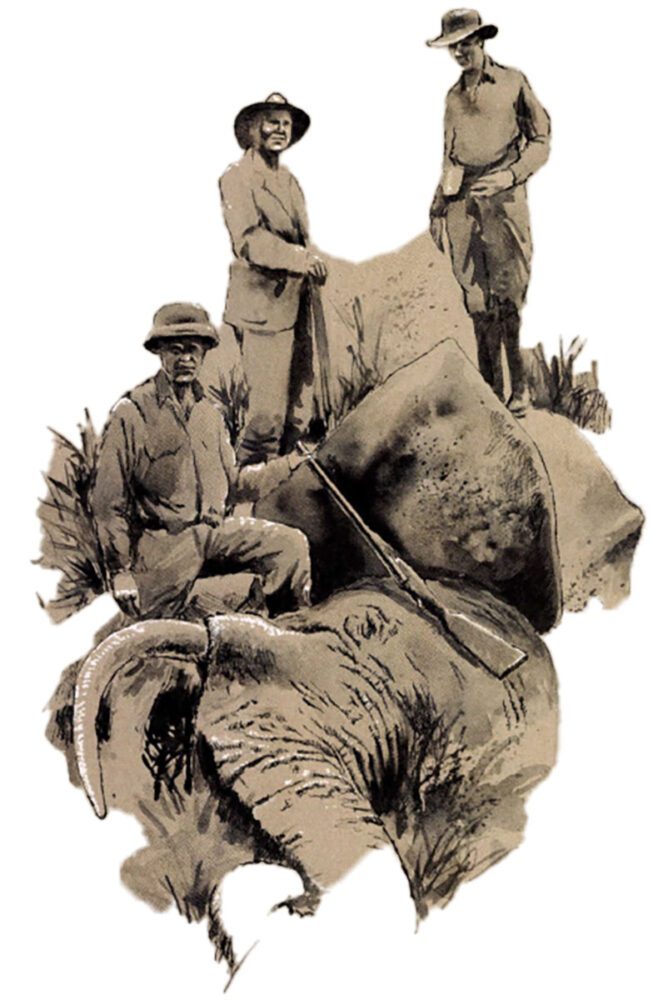 After leaving the elephants we were on our way back to camp when we saw a white man in the trail ahead; and oncoming nearer whom should it prove to be but Carl Akeley, who was out on a trip for the American Museum of Natural History in New York. We went with rum to his camp, where we found Mrs. Akeley, Clark, who was assisting him, and Messrs. McCutcheon and Stevenson who were along on a hunting trip. They were old friends and I was very glad to see them. McCutcheon, the cartoonist, had been at a farewell lunch given me by Robert Collier just before I left New York, and at the lunch we had been talking much of George Ade, and the first question I put to him was “Where is George Ade?” for if one unexpectedly meets an American cartoonist on a hunting trip in mid-Africa there seems no reason why one should not also see his crony, an American playwright. A year previously, Mr. and Mrs. Akeley had lunched with me at the White House, and we had talked over our proposed African trips. Akeley, an old African wanderer, was going out with the especial purpose of getting a group of elephants for the American Museum, and was anxious that I should shoot one or two of them for him. I had told him that I certainly would if it were a possibility; and on learning that we had just seen a herd of cows he felt — as I did — that the chance had come for me to fulfill my promise. So we decided that he should camp with us that night, and that next morning we would start with a light outfit to see whether we could not overtake the herd.
After leaving the elephants we were on our way back to camp when we saw a white man in the trail ahead; and oncoming nearer whom should it prove to be but Carl Akeley, who was out on a trip for the American Museum of Natural History in New York. We went with rum to his camp, where we found Mrs. Akeley, Clark, who was assisting him, and Messrs. McCutcheon and Stevenson who were along on a hunting trip. They were old friends and I was very glad to see them. McCutcheon, the cartoonist, had been at a farewell lunch given me by Robert Collier just before I left New York, and at the lunch we had been talking much of George Ade, and the first question I put to him was “Where is George Ade?” for if one unexpectedly meets an American cartoonist on a hunting trip in mid-Africa there seems no reason why one should not also see his crony, an American playwright. A year previously, Mr. and Mrs. Akeley had lunched with me at the White House, and we had talked over our proposed African trips. Akeley, an old African wanderer, was going out with the especial purpose of getting a group of elephants for the American Museum, and was anxious that I should shoot one or two of them for him. I had told him that I certainly would if it were a possibility; and on learning that we had just seen a herd of cows he felt — as I did — that the chance had come for me to fulfill my promise. So we decided that he should camp with us that night, and that next morning we would start with a light outfit to see whether we could not overtake the herd.
An amusing incident occurred that evening. After dark some of the porters went through the reeds to get water from the pond in the middle of the swamp. I was sitting in my tent when aloud yelling and screaming rose from the swamp, and in rushed Kongoni to say that one of the men, while drawing water, had been seized by a lion. Snatching up a rifle I was off at a run for the swamp, calling for lanterns; Kermit and Tarlton joined me, the lanterns were brought, and we reached the meadow of short marsh grass which surrounded the high reeds in the middle. No sooner were we on this meadow than there were loud snortings in the darkness ahead of us, and then the sound of a heavy animal galloping across our front. It now developed that there was no lion in the case at all, but that the porters had been chased by a hippo. I should not have supposed that a hippo would live in such a small, isolated swamp; but there he was on the meadow in front of me, invisible, but snorting, and galloping to and fro. Evidently, he was much interested in the lights, and we thought he might charge us; but he did not, retreating slowly as we advanced, until he plunged into the little pond. Hippos are sometimes dangerous at night, and so we waded through the swamp until we came to the pool at which the porters filled their buckets, and stood guard over them until they were through; while the hippo, unseen in the darkness, came closer to us, snorting and plunging – possibly from wrath and insolence, but more probably from mere curiosity.
Next morning Akeley, Tarlton, Kermit, and J started on our elephant hunt. We were traveling light. I took nothing but my bedding, wash kit, spare socks, and slippers, all in a roll of waterproof canvas. We went to where we had seen the herd and then took up the trail, Kongoni and two or three other gun-bearers walking ahead as trackers. They did their work well. The elephants had not been in the least alarmed. Where they had walked in single file it was easy to follow their trail; but the trackers had hard work puzzling it out where the animals had scattered out and loitered along feeding. The trail led up and down hills and through open thorn scrub, and it crossed and recrossed the wooded water courses in the bottoms of the valleys. At last, after going some 10 miles we came on sign where the elephants had fed that morning, and four or five miles further on we overtook them. That we did not scare them into flight was due to Tarlton. The trail went nearly across wind; the trackers were leading us swiftly along it, when suddenly Tarlton heard a low trumpet ahead and to the right hand. We at once doubled back, left the horses, and advanced toward where the noise indicated that the herd was standing.
In a couple of minutes we sighted them. It was just noon. There were six cows, and two well-grown calves — these last being quite big enough to shift for themselves or to be awkward antagonists for any man of whom they could get hold. They stood in a clump, each occasionally shifting its position or lazily flapping an ear; and now and then one would break off a branch with its trunk, tuck it into its mouth, and withdraw it stripped of its leaves. The wind blew fair, we were careful to make no noise, and with ordinary caution we had nothing to fear from their eyesight. The ground was neither forest nor bare plain; it was covered with long grass and a scattered open growth of small, scantily leaved trees, chiefly mimosas, but including some trees covered with gorgeous orange-red flowers. After careful scrutiny we advanced behind an anthill to within 60 yards, and I stepped forward for the shot.
Akeley wished two cows and a calf. Of the two best cows one had rather thick, worn tusks; those of the other were smaller, but better shaped. The latter stood half facing me, and I put the bullet from the right barrel of the Holland through her lungs, and fired the left barrel for the heart of the other. Tarlton, and then Akeley and Kermit followed suit. At once the herd started diagonally past us, but half halted and faced toward us when only 25yards distant, an unwounded cow beginning to advance with her great ears cocked at right angles to her head; and Tarlton called “Look out; they are coming for us.” At such a distance a charge from half a dozen elephant is a serious thing; I put a bullet into the forehead of the advancing cow, causing her to lurch heavily forward to her knees; and then we all fired. The heavy rifles were too much even for such big beasts, and round they spun and rushed off. As they turned I dropped the second cow I had wounded with a shot in the brain, and the cow that had started to charge also fell, though it needed two or three more shots to keep it down as it struggled to rise. The cow at which I had fired kept on with the rest of the herd, but fell dead before going a hundred yards. After we had turned the herd Kermit with his Winchester killed a bull calf, necessary to complete the museum group; we had been unable to kill it before because we were too busy stopping the charge of the cows. I was sorry to have to shoot the third cow, but with elephant starting to charge at 25 yards the risk is too great, and the need of instant action too imperative, to allow of any hesitation.
We pitched camp a hundred yards from the elephants, and Akeley, working like a demon, and assisted by Tarlton, had the skins off the two biggest cows and the calf by the time night fell; I walked out and shot an oribi for supper. Soon after dark the hyenas began to gather at the carcasses and to quarrel among themselves as they gorged. Toward morning, a lion came near and uttered a kind of booming, long-drawn moan, an ominous and menacing sound. The hyenas answered with an extraordinary chorus of yelling, howling, laughing, and chuckling, as weird a volume of noise as any to which I ever listened. At dawn we stole down to the carcasses in the faint hope of a shot at the lion. However, he was not there; but as we came toward one carcass a hyena raised its head seemingly from beside the elephant’s belly, and I brained it with the little Springfield. On walking up it appeared that I need not have shot at all. The hyena, which was swollen with elephant meat, had gotten inside the huge body, and had then bitten a hole through the abdominal wall of tough muscle and thrust his head through. The wedge-shaped head had slipped through the hole all right, but the muscle had then contracted, and the hyena was fairly caught, with its body inside the elephant’s belly, and its head thrust out through the hole. We took several photos of the beast in its queer trap.
After breakfast we rode back to our camp by the swamp. Akeley and Clark were working hard at the elephant skins; but Mrs. Akeley, Stevenson, and McCutcheon took lunch with us at our camp. They had been having a very successful hunt; Mrs. Akeley had to her credit a fine maned lion and a bull elephant with enormous tusks. This was the first safari we had met while we were out in the field; though in airobi, and once or twice at outlying bomas, we had met men about to start on, or returning from, expeditions; and as we marched into Meru we encountered the safari of an old friend, William Lord Smith -“Tiger” Smith – who, with Messrs. Brooks and Allen, were on a trip which was partly a hunting trip and partly a scientific trip undertaken on behalf of the Cambridge Museum.
From the ‘Nzoi we made a couple days’ march to Lake Sergoi, which we had passed on our way out; a reed-fringed pond, surrounded by rocky hills which marked about the limit to which the Boer and English settlers who were taking up the country had spread. All along our route we encountered herds of game; sometimes the herd would be of only one species; at other times we would come across a great mixed herd, the red hartebeest always predominating; while among them might be zebras, showing silvery white or dark gray in the distance, topis with beautifully colored coats, and even waterbuck. We shot what hartebeests, topis, and oribis were needed for food. All over the uplands we came on the remains of a race of which even the memory has long since vanished. These remains consist of large, nearly circular walls of stones, which are sometimes roughly squared. A few of these circular enclosures contain more than one chamber. Many of them, at least, are not cattle kraals, being too small, and built round hollows; the walls are so low that by themselves they could not serve for shelter or defense, and must probably have been used as supports for roofs of timber or skins. They were certainly built by people who were in some respects more advanced than the savage tribes who now dwell in the land; but the grass grows thick on the earth mounds into which the ancient stone walls are slowly crumbling, and not a trace of the builders remains. Barbarians they doubtless were; but they have been engulfed in the black oblivion of a lower barbarism, and not the smallest tradition lingers to tell of their craft or their cruelty, their industry or prowess, or to give us the least hint as to the race from which they sprang.
We had with us an ox wagon with the regulation span of 16 oxen, the driver being a young colonial Englishman from South Africa — for the Dutch and English Africanders are the best ox-wagon drivers in the world. On the way back to Sergoi he lost his oxen, which were probably run off by some savages from the mountains; so at Sergoi we had to hire another ox wagon, the South African who drove it being a Dutchman named Botha. Sergoi was as yet the limit of settlement; but it was evident that the whole Uasin Gishucountry would soon be occupied. Already many Boers from South Africa, and a number of English Africanders, had come in; and no better pioneers exist today than these South Africans, both Dutch and English. Both are so good that I earnestly hope they will become indissolubly welded into one people; and the Dutch Boer has the supreme merit of preferring the country to the town and of bringing his wife and children — plenty of children — with him to settle on the land. The homemaker is the only type of settler of permanent value; and the cool, healthy, fertile Uasin Gishu region is an ideal land for the right kind of pioneer homemaker, whether he hopes to make his living by raising stock or by growing crops.
At Sergoi Lake there is a store kept by Mr. Kirke, a South African of Scotch blood. With a kind courtesy which I cannot too highly appreciate he, with the equally cordial help of another settler, Mr. Skally — also a South African, but of Irish birth — and of the district commissioner, Mr. Corbett, had arranged for a party of Nandi warriors to come over and show me how they hunted the lion.
The Nandi are a warlike pastoral tribe, close kin to the Masai in blood and tongue, ill weapons and in manner of life. They have long been accustomed to kill lions which become man-eaters or which molest their cattle overmuch; and the peace which British rule has imposed upon them — a peace so welcome to the weaker, so irksome to the predatory, tribes — has left lion killing one of the few pursuits in which glory can be won by a young warrior. When it was told them that if they wished they could come to hunt lions at Sergoi 800 warriors volunteered, and much heart-burning was caused in choosing the 60 or 70 who were allowed the privilege.T hey stipulated, however, that they should not be used merely as beaters, but should kill the lions themselves, and refused to come unless with this understanding.
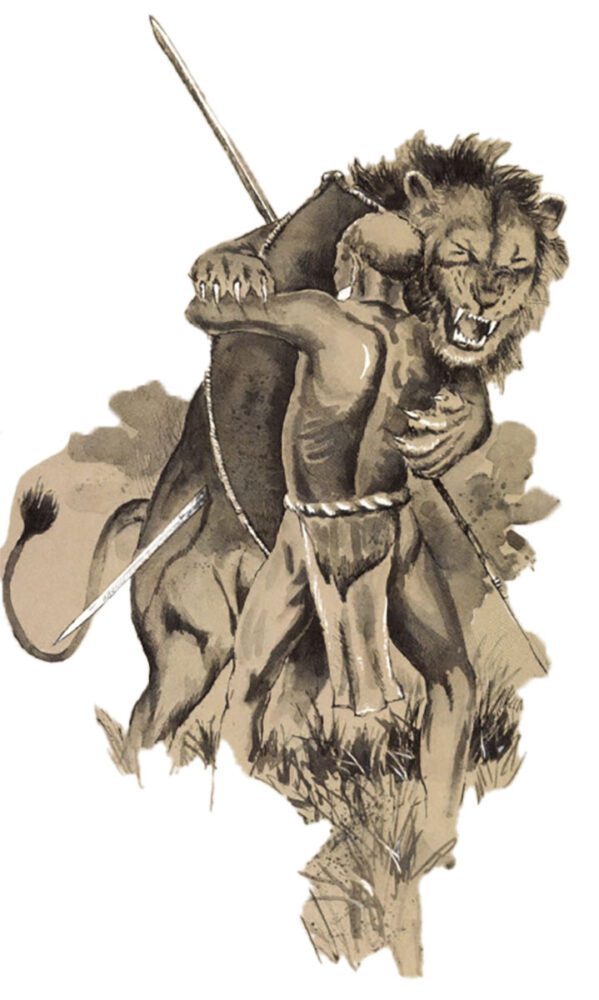 The day before we reached Sergoi they had gone out, and had killed a lion and lioness; the beasts were put up from a small covert and dispatched with heavy throwing spears on the instant, before they offered, or indeed had the chance to offer, any resistance. The day after our arrival there was mist and cold rain, and we found no lions. Next day, November 20th, we were successful.
The day before we reached Sergoi they had gone out, and had killed a lion and lioness; the beasts were put up from a small covert and dispatched with heavy throwing spears on the instant, before they offered, or indeed had the chance to offer, any resistance. The day after our arrival there was mist and cold rain, and we found no lions. Next day, November 20th, we were successful.
We started immediately after breakfast. Of course we carried our rifles, but our duty was merely to roundup the lion and hold him, if he went off so far in advance that even the Nandi runners could not overtake him. We intended to beat the country toward some shallow, swampy valleys 12 miles distant.
In an hour we overtook the Nandi warriors, who were advancing across the rolling, grassy plains in a long line, with intervals of six or eight yards between the men. They were splendid savages, stark naked, lithe as panthers, the muscles rippling under their smooth dark skins; all their lives they had lived on nothing but animal food, milk, blood, and flesh, and they were fit for any fatigue or danger. Their faces were proud, cruel, fearless; as they ran they moved with long springy strides. Their head-dresses were fantastic; they carried ox-hide shields painted with strange devices; and each bore in his right hand the formidable war spear, used both for stabbing and for throwing at close quarters. The narrow spearheads of soft iron were burnished till they shone like silver; they were four feet long, and the point and edges were razor sharp. The wooden haft appeared for but a few inches; the long butt was also of iron, ending in a spike, so that the spear looked almost solid metal. Yet each sinewy warrior carried his heavy weapon as if it were a toy, twirling it till it glinted in the sun rays. Herds of game, red hartebeests and striped zebra and wild swine, fled right and left before the advance of the line.
It was noon before we reached a wide, shallow valley, with beds of rushes here and there in the middle, and on either side high grass and dwarfed and scattered thorntrees. Down this we beat for a couple of miles. Then, suddenly, a maned lion rose a quarter of a mile ahead of the line and galloped off through the high grass to the right; and all of us on horseback tore after him.
He was a magnificent beast, with a black and tawny mane; in his prime, teeth and claws perfect, with mighty thews, and savage heart. He was lying near a hartebeest on which he had been feasting; his life had been one unbroken career of rapine and violence; and now the maned master of the wilderness, the terror that stalked by night, the grim lord of slaughter, was to meet his doom at the hands of the only foes who dared molest him.
It was a mile before we brought him to bay. It was a sore temptation to shoot him; but of course, we could not break faith with our Nandi friends. We were only some 60 yards from him, and we watched him with our rifles ready, lest he should charge either us, or the first two or three spearmen, before their companions arrived.
One by one the spearmen came up, at a run, and gradually began to form a ring round him. Each, when he came near enough, crouched behind his shield, his spear in his right hand, his fierce, eager face peering over the shield rim. As man followed man, the lion rose to his feet. His mane bristled, his tail lashed, he held his head low, the upper lip now drooping over the jaws, now drawn up so as to show the gleam of the long fangs. He faced first one way and then another, and never ceased to utter his murderous grunting roars. It was a wild sight; the ring of spearmen, intent, silent, bent on blood, and in the center the great man-killing beast, his thunderous wrath growing evermore dangerous.
At last the tense ring was complete, and the spearmen rose and closed in. The lion looked quickly from side to side, saw where the line was thinnest, and charged at his topmost speed. The crowded moment began. With shields held steady, and quivering spears poised, the men in front braced themselves for the rush and the shock; and from either hand the warriors sprang forward to take their foe in the flank. Bounding ahead of his fellows, the leader reached throwing distance; the long spear flickered and plunged; as the lion felt the wound he half turned, and then flung himself on the man in front. The warrior threw his spear; drove deep into the life, for entering at one shoulder it came out of the opposite flank, near the thigh, a yard of steel through the great body. Rearing, the lion struck the man, bearing down the shield, his back arched; and for a moment he slaked his fury with fang and talon. But on the instant I saw another spear driven clear through his body from side to side; and as the lion turned again the bright spear blades darting toward him were flashes of white flame. The end had come. He seized another man, who stabbed him and wrenched loose. As he fell he gripped a spear-head in his jaws with such tremendous force that he bent it double. Then the warriors were round and over him, stabbing and shouting, wild with furious exultation.
From the moment when he charged until his death I doubt whether 10 seconds had elapsed, perhaps less; but what a ten seconds! The first half-dozen spears had done the work. Three of the spear blades had gone clear through the body, the points projecting several inches; and these, and one or two others, including the one he had seized in his jaws, had been twisted out of shape in the terrible death struggle.
We at once attended to the two wounded men. Treating their wounds with antiseptic was painful, and so, while the operation was in progress, I told them, through Kirke, that I would give each a heifer. A Nandi prizes his cattle rather more than his wives; and each sufferer smiled broadly at the news, and forgot all about the pain of his wounds.
Then the warriors, raising their shields above their heads, and chanting the deep-toned victory song, marched with a slow, dancing step around the dead body of the lion; and this savage dance of triumph ended a scene of as fierce interest and excitement as I ever hope to see.
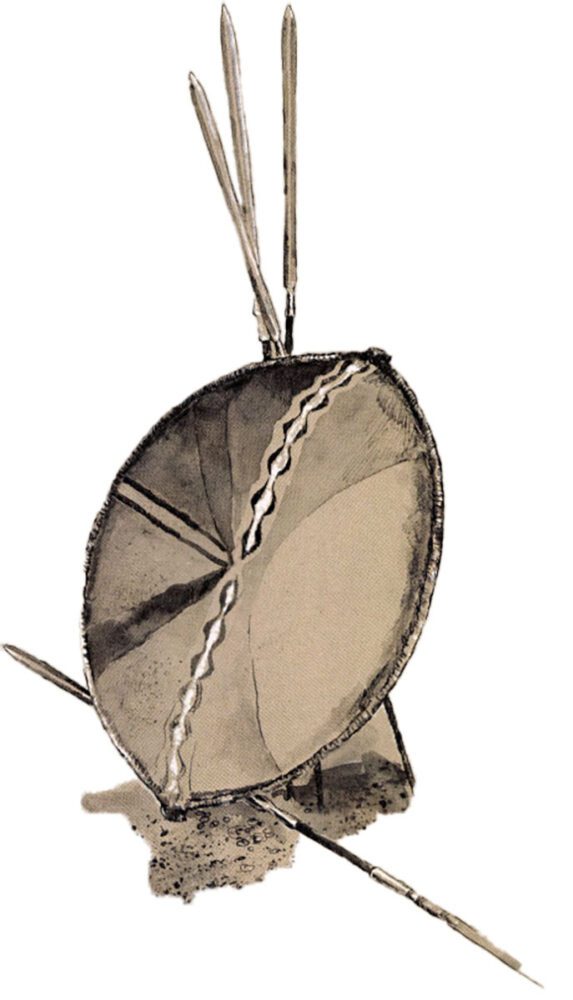 The Nandi marched back by themselves, carrying the two wounded men on their shields. We rode to camp by a roundabout way, on the chance that we might see another lion. The afternoon waned and we cast long shadows before us as we road across the vast lonely plain. The game stared at us as we passed; a cold wind blew in our faces, and the tall grass waved ceaselessly; the sun set behind a sullen cloud bank; and then, just as nightfall, the tents glimmered white through the dusk.
The Nandi marched back by themselves, carrying the two wounded men on their shields. We rode to camp by a roundabout way, on the chance that we might see another lion. The afternoon waned and we cast long shadows before us as we road across the vast lonely plain. The game stared at us as we passed; a cold wind blew in our faces, and the tall grass waved ceaselessly; the sun set behind a sullen cloud bank; and then, just as nightfall, the tents glimmered white through the dusk.
Editor’s Note: this article originally appeared in African Game Trails, 1910 Syndicate Publishing Company, NY and London; and Charles Scribner’s’ Sons, NY — and was reprinted in the 1986 July/August issue of Sporting Classics.
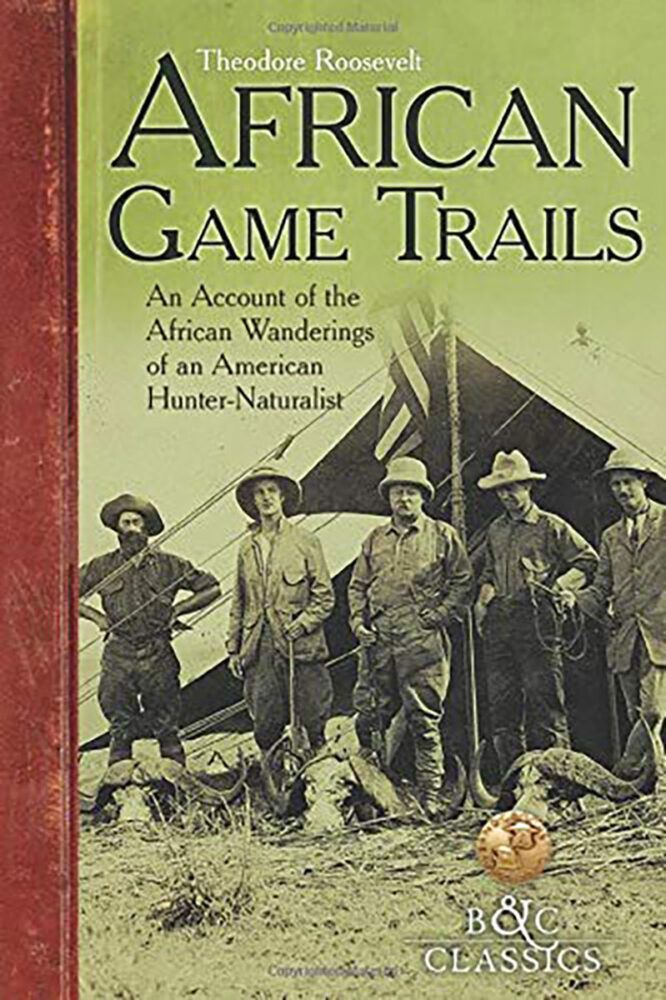 Relive Roosevelt’s account of his African wanderings as an American hunter-naturalist. This superb volume includes over 100 photographs. drawings, and maps from the original publication, as well as bonus images not found in other editions. Buy Now
Relive Roosevelt’s account of his African wanderings as an American hunter-naturalist. This superb volume includes over 100 photographs. drawings, and maps from the original publication, as well as bonus images not found in other editions. Buy Now

